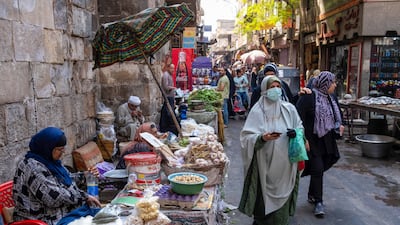Power cuts are making an unwelcome comeback in Egypt, due to a combination of summer temperatures lingering into November and a shortage of natural gas.
Until last summer Egyptians thought power outages were a thing of the past, thanks to the billions of dollars the government has spent over the past decade on cutting-edge power stations, distribution networks and the rapidly expanding production of clean energy.
However, last summer's unforgiving heat – temperatures routinely crossed the 40°C threshold – intensified pressure on the country’s grid and natural gas supplies as citizens stayed at home and kept their fans and air conditioning units on.
The rise in energy consumption forced authorities to cut power nationwide for an average of one hour every day. At the time, the government said the outages would stop by October at the latest.
The move seemed particularly surprising since the government had repeatedly boasted about its surplus electricity production that it was considering exporting.
Since last weekend power cuts have been lasting for two hours per day – four in the Mediterranean port city of Alexandria – which is twice as long as this summer's outages, although temperatures in October are much cooler, averaging 30-32°C.
Explaining the power cuts, government spokesman Sameh El Khishen this week said: “Out of concern for the safe and continuing operation of the electricity grid and to avoid (unscheduled) power cuts, we have decided to lighten its load until temperatures return to their average level for this time of year.”

He said Egypt's daily import of 800 million cubic feet of natural gas, which is used to operate several of the new power stations, has dropped to zero.
He did not elaborate, but officials have privately explained that Israel has stopped its substantial gas exports to Egypt for security reasons since the October 7 outbreak of the Gaza war.
Chevron, which operates Israel’s large Tamar natural gas field, was reportedly instructed to shut production at its offshore platform by the government.
Egypt relies on gas imports from Israel to meet some of its domestic demand, as well as re-exporting to Europe via its liquefied natural gas facilities. The unusually hot weather meant Egypt was consuming all the gas that it was producing, leaving little for overseas shipments.
Mr El Khishen, the Egyptian government spokesman, also cited a drop in the production of clean energy as a reason behind the power cuts, without elaborating on the reasons behind that drop.
Egypt's power cuts have dominated national conversation in recent days, with a flood of angry social media posts by frustrated Egyptians on one hand, and many pro-government TV hosts keen on supporting the official line on the other.
Outages, both in the summer and now, have worsened the suffering of Egyptians struggling to cope with a crushing economic crisis the government blames entirely on the coronavirus pandemic and the Russia-Ukraine war.
They also come ahead of presidential elections scheduled for December.

Although President Abdel Fattah El Sisi is virtually set to win the vote, securing his third term in office, analysts fear that angry voters could boycott the vote in protest, undermining the predicted landslide victory Mr El Sisi wants to introduce painful reforms to revive the battered economy.
Egypt in 2015 discovered the Zohr natural gas field off its Mediterranean coast, which produces around 2.3 billion cubic feet per day.
But the nation’s gas exports and the growing consumption of its 105 million people have given rise to shortages at home.
Egypt has a power-generating capacity that stands at 48,000 megawatts, with local consumption estimated at a maximum of 36,000MW, leaving it with a surplus of 12,000MW.
Consumption in July and August peaked to 34,650MW, which is below the total output but dangerously close.


